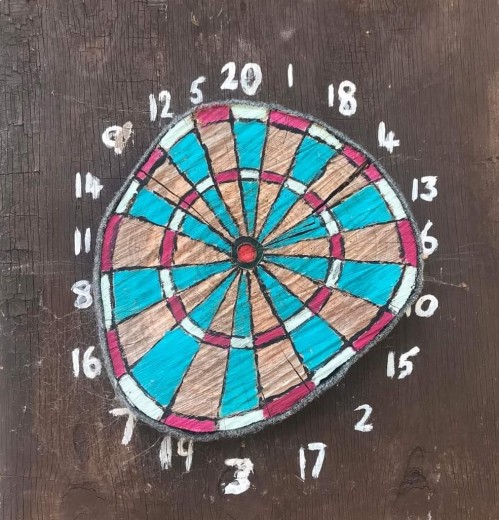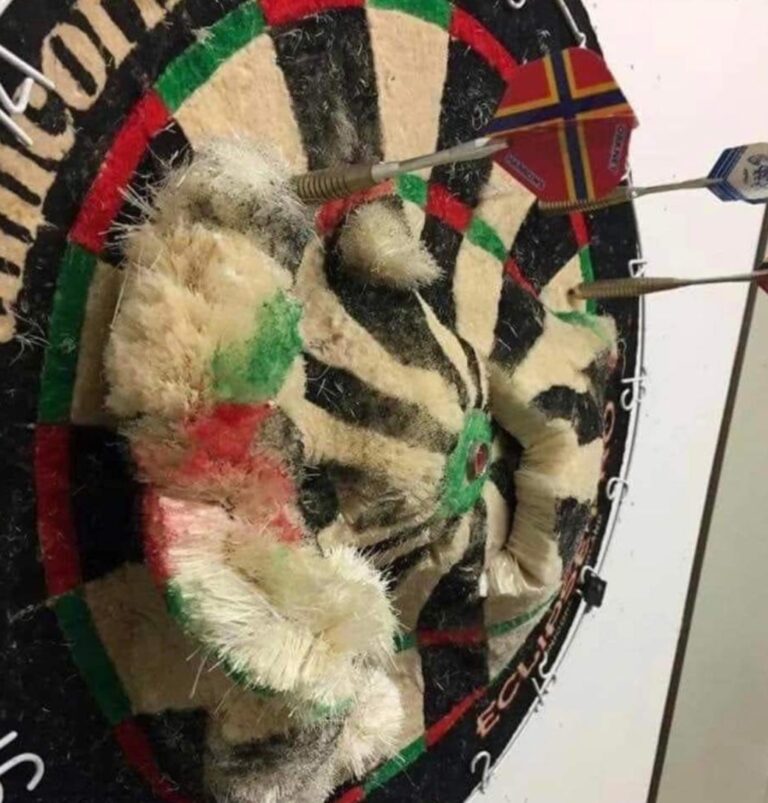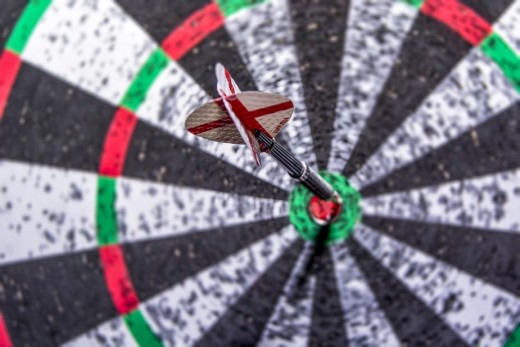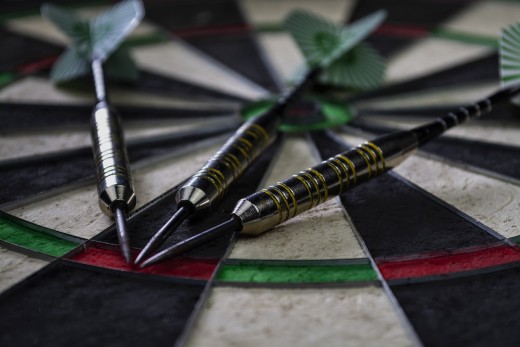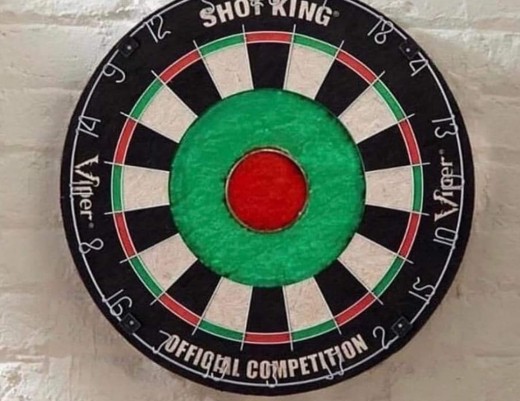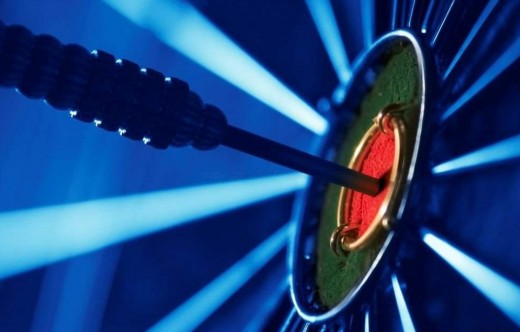June 1, 2003
Column 138
Philadelphia Moments
A team came from jolly olde England, to fun city, on St Patrick’s Day
“The best in the world,” they were touted, when they came to the U.S. to play
It is true that they were never beaten, and were entitled to worldwide fame
But the team brimmed with overconfidence the day that they stepped off the plane
The Yanks were just rank beginners, and the English would put them to shame
Why, the Yanks still threw wooden darts, they had used in the American game
The dart world was in for a shocker, from the time the first dart was thrown
The crowd could hardly believe it, the Yanks were holding their own
The people all cheered for their idols, the excitement hung heavy in the room
And the smiles of the Englishmen had vanished, as the Yanks had sealed their doom
When all of the scoring was over, the Champions had been dethroned
But their pride could never be taken, the defeat must be atoned
The Champion from Wales gave a challenge, to play any Yank in the hall
One game for a thousand dollars, to be paid by the one who would fall
Ray Fischer accepted the challenge, to play Alan Evans of Wales
He offered to play 501 and was laughed at: “That game’s not for males”
“Let’s play a man’s game,” England answered, the score should be 3,001″
Ray Fischer accepted the figure, and opened with a “ton”
The match was no even contest; Ray Fischer had won great fame
As he beat the great Champion soundly, by throwing a 99-dart game
The World Title still belongs to England, but notice has hereby been served
That the U.S.A. is coming, and believe that as gospel word!
— Jerry Walters (1974)
It’s been almost thirty years now. Hot-shot darting whippersnappers like Jason Jarvis, John Kuczynski and Ray Carver weren’t even embryos that night at New York’s Royal Manhattan Hotel. Yep, what was possibly THE defining moment in the history of the sport of darts in America has been lost for three decades time. But that’s not the beginning of this story. It’s the end.
It’s been five years since I rang Mary Jo Chesney and explained my idea. She probably doesn’t even remember my call. I was starting to work on a column about darts in Philadelphia. It was going to be called The Philadelphia Story. I wondered if she could point me in the right direction.
Mary Jo was helpful. She directed me to Timmy’s (formerly the Shootin’ Star) at 5216 Torresdale. Owned by Timmy Murphy and set in the tough working-class Kensington-Mayfair neighborhood, the address has been near the center of darts action in Philadelphia for about as long as anyone can remember.
Mary Jo arranged for me to meet up with the late, great Larry Wiz. But I was lazy. I blew the night away drinking and watching a ball game at some hotel bar instead. I didn’t make it to Timmy’s, until last night. But again, that’s not part of the beginning of this story. It’s part of the end.
Since my call to Mary Jo, the idea of putting to paper a string of words that somehow captured the essence of the Philadelphia darts scene is something I have stepped to the line and then backed away from more times than I can count. The more I researched –the more I ventured into the old neighborhood pubs — the more intimidated I became. I became intimidated not because I grew convinced that writing the “story” of Philadelphia darts was beyond my limited capabilities – although it is. I decided to scrap the big story and write instead about a Philadelphia “moment” or two mainly because I was afraid that some big dude like Mike Naulty might hunt me down and whack my ass if didn’t get the story right.
My idea was simple. I was going to walk in the footsteps of history. I was going to stand at the same lines and throw through the same air where the long-forgotten greats of our sport in America set the standards for the shooters of today. Then, as the night grew late, somewhere in the smoke and haze of some old pub, my hope was to meet up with history itself, shake hands, toss back a pint or two, and toe-the-line in friendship.
So I began my monster pub-crawl…
Gone is Al’s Pub (owned by the late Al “the Iceman” Lippman). Gone is the famous Manor Bar (owned by Charlie Young). The roof leaked at the Manor. It was standard on rainy nights for darters to toss through the water that dripped heavily from the ceiling and to side-step the pails which were stationed between the oches and the boards to catch the flow of raindrops. Sadly, gone also are Joe & Jeans and Postal II, the Silver Lounge and Walter’s (author of the poem above) old joint.
But some still stand. Lord Cheltenham’s is there. So are Pat’s Pub, the Aquarium and Irish Kitchen, Foederer’s Club and Ralph’s Bar (now called Shooters), Danny’s (formerly Charlie’s) and Dell’s. And yep, Dell’s is still a dive. They all still have boards; they just aren’t much at the center of the darts scene any more. What they are is at the very heart of darts history in Philadelphia and America.
Along the way I was bombarded with stories, amazing tales actually, about the prowess of the great Philadelphia shooters of a bygone day. The names are familiar, at least in the old neighborhoods. The pacesetters of our sport in America are granted a hallowed place, a position of reverence, among literally everybody involved in the Philadelphia darts scene. What is unfortunate is how unfamiliar the names of the forerunners of our sport in America are outside of the neighborhoods and the pubs from which they hailed.
Fischer, Lippman and Young. Helen Scheerbaum. Adele Nutter. Frank Ennis. Dan Valleto. Dick Yost. Bob Theide. “Tex” Blackwood. Norm Finley. Bill Robinson. Joe Baltadonis. George Silberzahn. Rick Wobensmith. Ernie Rill. Dick McInnis. Dick Del Castillo. Jerry Umberger. Brian Dougherty. John McShane. There isn’t a soul among the Philadelphia darts scene who can’t (and doesn’t, respectfully) recite these names — and a whole lot more. And rightly so. They represent the very foundation of the sport of darts in America.
Fischer, a retired insurance appraiser, now 72 years of age, won back-to-back North American Opens, in 1972 and 1973. Amazingly, he won the first time throwing widdies! Scheerbaum, who just turned 80 years old, started shooting American darts as a youngster almost seven decades ago in the bar her parents owned. At just twelve years of age she could consistently score in the middle forties on an American board. In 1974 she went on an incredible steel-tip tear and became the first lady in darts to chalk up five major titles (including the North American Open) in one year. Now 65 and still as competitive as ever, Nutter won the United States Darting Association (USDA) championship way back in 1971 at about the same time the Supreme Court was upholding desegregated bussing. More on these three darters in a moment…
When it comes to the other Philadelphia greats — and so many more than I am certain to fail to mention — the lore (or as To the Point author, Dan Peek, has put it: the “oral history”) has become the stuff of legend. Back in the days before the darting boom, in the days when real darts was about shooting for money, the Philadelphia crowd had a near lock on the action. On Friday nights the best of the best would regularly gather at Dicken’s or the Crooked Fence in New York City. Other times the New York crew would travel down to Trenton to shoot at Conrad Daniel’s pub, the Vet Tavern. But always it was about the money — and boasting rights. The bars would “lockdown” and play would run continuously from Friday night until Sunday afternoon.
In the midst of this environment it was only natural that unique personalities would emerge. Blackwood, for example, carried his darts in a holster strapped to his waist. In a mask and cloak, Yost used to hustle money in the suburbs “disguised” as the Masked Avenger.
Today some darters hone a special skill that might prove handy when a few bucks are on the table. Some of us can throw accurately with either hand. Some of us can hit the mark with a flight-first release. Some of us can score without flights, without shafts or with nails. In the old days of the Philadelphia greats, in the days of real money darts, this was all weak-sister shit.
Theide could toss widdies through the neck of an open bottle. He once shot a television commercial performing this feat for Wishbone salad dressing. Robinson could blow widdies from his mouth and consistently score in the forties. Others could stick playing cards into the board by flicking them, the same way kids do, into a hat. Near the end of play, Finley was known to sneak a small paper match to the board when he pulled his darts — leaving just the sulfur tip inside the wire of his double. Then, after his opponent threw and pulled his darts, Finley would step to the line, aim and release his final shot, and literally set his final double to flame.
And so it came to pass one day back in 1974 that a team of British darters were given a free cruise on the Queen Elizabeth. One of their stops was New York City. Never one to miss an opportunity, promoter Bob McLeod leapt into action to stage the first ever trans-Atlantic team competition that culminated in the grudge match captured in the poem at the start of this story.
The names of most of those who were among the boisterous couple of hundred darters in attendance that St. Patrick’s Day night at the Royal Manhattan Hotel seem pretty much lost forever. What is clear is who (among the best shooters in the world) was not in the room that eventful evening. Missing for the British were John Lowe, Eric Bristow, Bobby George, Leighton Rees and Jocky Wilson. Absent for the Americans were Lippman and Daniels. Lippman won the USDA championship in 1973 and 1974 and was a finalist in England’s prestigious News of the World tournament the same two years. Daniel’s was a Grand Finalist in the News of the World in 1975.
But by all accounts everybody else was there and Philadelphians Baltadonis, Ennis, Blackwood and Fischer were in the thick of it. The British were led by the fiery Welshman, the late Alan Evans. So fiercely competitive (and patriotic) was Evans that he once — in televised World Championship play with Wilson — threatened to break his opponent’s jaw.
The team competition did not go the way the British and pretty much everybody else in the room had every right to assume it would. In an unprecedented upset, the Americans took the match by a convincing score of 11-7. By all accounts, as this was the first time an American team had ever bested a British team at darts, the British contingent was enraged. And Evans was literally out of his mind.
As one British journalist recollected in 1989, “…the Americans still relish thoughts of the War of Independence, the defeat of the British in 1812 and the fateful day fifteen years ago that a darts team from the S.S. United States beat the crew of the Queen Elizabeth in a New York bar.”
Ah, but that was only the half of it…
Amidst the smoke and drink and hubbub that ensued, it should come as no surprise that a major money-match quickly bubbled to the fore. The game: 3,001. Evans would stand up for the British. Known for money-game nerves of steel, Fischer was selected to toe-the-line for the Americans. A thousand bucks was quickly anted up by each side.
The result of this spontaneous match-up was even more surprising than the result of the team competition. Fischer was more than up to the challenge.
What’s most surprising however, is how Fischer, arguably one of the best arrowmen this nation has ever produced (once described by Barry Twomlow as “the best shooter (he’d) ever seen”), recalls the moment. And that folks, brings me back to the beginning of this story. Or the end. Oh, who the hell knows.
I followed the footsteps of the Philadelphia greats through the old neighborhood pubs and eventually met up with Fischer (and Scheerbaum and Nutter) at Timmy’s on Torresdale. Behind the bar was McShane. At the bar was Del Castillo. Ennis was able to make it at the last minute. It was damn near a “who’s who” of the old Philadelphia darts scene. The group was eventually joined by young shooters, Mike Broderick and Brian Sweeney.
Knowing a whole lot about Fischer’s accomplishments over the years, but knowing absolutely nothing of that night long ago at the Royal Manhattan Hotel, I said to Fischer, “Ray you’ve had quite a career. Tell me, what’s the proudest moment you’ve experienced in the sport?”
That’s when he pulled out Walter’s poem. That’s when he pulled out the score sheet from his duel against Evans. That’s when he told me about the night when America — Philadelphia — was the best in the world — the night he closed the d16 to defeat Evans, leaving Evans with a fat 231 on the board. “That was my proudest moment.” he said. “I don’t know why they picked me to shoot. I said I’d do my best. I hit 17 tons or better and finished with a 95 point average.”
So I said, “That’s quite a story, Ray. But do you think you can take me?”
Okay, that’s a lie. But we did mosey down memory lane, with Scheerbaum and Nutter and the others and, eventually, moved to the back room for a little bit of 601, three-on-three. One set. Best of seven legs. Fischer, Nutter and Sweeney versus Scheerbaum, Broderick and Dartoid.
It was three sharp-shooting old farts teamed up with two sharp-shooting young farts. And then there was me. I’m just a plain fart.
Sorry darts and even sloppier finishing couldn’t prevent Fischer, Nutter and Sweeney from leaping quickly to a 3-0 lead. Nutter closed the first leg on d3. Fischer closed the second and third legs with d3 and d4. My team was one leg away from being shut out. We were toast.
Except we had Scheerbaum!
With 169 remaining I pulled a 137 from OUT OF MY ASS to set up Scheerbaum’s next trip to the line. She took out the d16 with her first dart to give us our first leg.
Scheerbaum, Broderick and I then began to struggle again. Fortunately Scheerbaum hung tough. She took out the d2 to give us the fifth leg. Then, after I busted an 80-out and Broderick wired the double top high, Scheerbaum stepped up again and, BOOM, closed the number to even up the match at 3-all.
All by herself, octogenarian Helen Scheerbaum carried Broderick and me into the rubber match.
So we worked it down.
We’re lookin’ at 72. Fischer, Nutter and Sweeny have 176 left on the board. It’s my throw. That’s when Scheerbaum whispers in my ear, “Take it OUT Dartoid. I’ve never beaten that rascal Ray before!”
Oh shit!
My first dart nails the t20. Just d6 to close. I set. Stroke. Release. But my dart lands low and I bust the opportunity for glory by sticking the d15.
Fischer pops in 140 leaving Nutter d18.
Broderick steps up. 76 remaining. Scheerbaum doesn’t whisper. “STICK IT, Mike!” she yells.
Broderick strokes confidently. He wires the t12 high. Sixty remains. He’s got two darts in his hand. He marks his third dart with a nice stroke into the 20, just under the double top wire. He steps back. He takes a breath. He walks back to the line. He glances briefly at Scheerbaum and me. He sets. Strokes. And, oh so nicely, Broderick’s final dart nestles itself just above his marker and into the d20 bed.
Pandemonium!!
Well, not exactly. At least it was nothing compared to how it must have been so many years ago when Fischer and the all the rest of the boys from Philadelphia served notice to the darting world.
We grabbed one last beer. We commiserated briefly. We parted company.
It was just another moment, another good time at the line, among so incredibly many, in a city that richly deserves its place at the heart of the darts scene in America.
From the Field,
Dartoid

